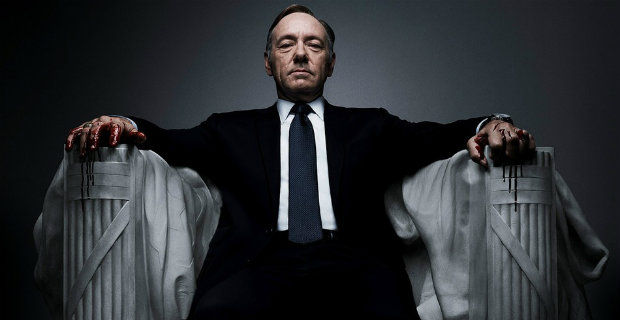Everyone’s favorite murdering, conniving, scheming, lying, and manipulating politician is back! Netflix’s hit series House of Cards released its third season on Friday, February 27th. After two seasons of political intrigue and machinations, Francis (Frank) J. Underwood has finally climbed to the top of America’s government, but now must face attacks from all sides as his term comes to a close.
Despite some hiccups and a stray subplot, this season is House of Card’s strongest. Showrunner Beau Willimon smartly places the season’s focus on some central character arcs.
With Frank’s rise to power complete, other characters are highlighted, particularly Claire Underwood (Robin Wright, channeling her best Lady Macbeth). In the first two seasons, Claire’s subplots felt disjointed from Frank’s political maneuverings, and they lacked the compelling urgency that Frank’s face-offs with various political enemies had.
Fortunately, season three improves on this issue. Claire is central to the show’s storyline, and by the end of the season, her actions cause the entire dynamic of the show to change. Wright’s expert portrayal conveys the internal conflict Claire feels in her facial expressions instead of her dialogue. House of Cards is one of the few shows to trust its viewers to understand what the characters are going through without having to say it outright. In the past, Underwood broke the fourth wall to explain to the audience what was going on, but this season he doesn’t do this as often. Both Wright and Kevin Spacey have mastered the art of using a lingering stare or a facial expression change to convey what their character is going through.
Some of the show’s symbolism (like the crucifix falling at the end of Chapter 30) is heavy-handed, but it’s a testament to the strength and subtleties of the performances that these obvious moments are few and far-between. Also of note is Doug Stamper (Michael Kelly), in a triumphant return from his presumed death at the end of season two. Stamper’s arc starts slowly, but builds and finishes with an incredible payoff (to say more would risk spoilers).
Interestingly enough, the show also tones down the sexual content significantly. Instead, Willimon ratchets up the political tension to keep the viewer engaged (take notes, Game of Thrones). House of Cards’ strength has always been its ability to make political procedure palatable for mainstream audiences, and this season draws on several contemporary issues such as unrest in the Middle East, the Russia-US power struggle and a contested fight for the Democratic nomination to give the show relevance. Lars Mikkelsen’s performance as the Russian president is especially fun to watch, and his showdowns with Spacey are easily some of the season’s highlights. Gone are inane plot points like the Vice President committing murder. In fact, many of the issues Underwood has to wrestle with are frighteningly plausible.
Where the season stumbles, however, is in the subplot involving Gavin Orsay, last season’s quirky hacker. Orsay’s storyline is the means to an end, and could have been easily wrapped up in an episode, but the writers decide to stretch it out over the course of the season and Orsay’s character is given little resolution. A quick end to his story would have given Stamper more time to wrestle with his responsibility to hunt Rachel down, but instead this storyline is rushed to its conclusion in the final episode.
Season three’s greatest strength is its portrayal of Underwood’s vulnerability. It was always a joy to watch Frank’s wonderfully convoluted plans be fulfilled in the first two seasons, but they lacked real tension. In this season, Underwood faces legitimate losses, and even his victories come at a steep cost. What’s particularly intriguing is his relationship with Claire, and how it devolves throughout the course of the season. At the end of the day, House of Cards is about the marriage of Claire and Frank, not the political achievements of the latter. Some of the character’s relationships, such as Remy and Jackie’s, tread water or regress by the end of the season, but the evolution of Claire and Frank are the core of the show, and rightfully so.
The ending of season three doesn’t feel like a series finale, but Willimon could finish here and the show would end satisfactorily. While the finales of season one and two were dramatic and bombastic, this finale relies on the interactions of its characters, and the result is incredible. Without giving away too much, Frank and Claire’s character arcs intersect and the showdown between the two is gripping. If Willimon chooses to make a season four, the groundwork has been laid for Underwood’s house of cards to collapse in on itself.
While the future of the Underwood administration is unclear, what is apparent is that House of Cards has just begun to hit its stride. There’s no word yet on the future of the show, but what is clear is that viewers around the world will await word on the show’s return with bated breath. We can only hope that Willimon decides to reelect Underwood for another season.
Photo: cdn.screenrant.com







How does Remy and Jackie’s relationship regress? I mean they seem to end on a seemingly good note.
seem to end on a good note*